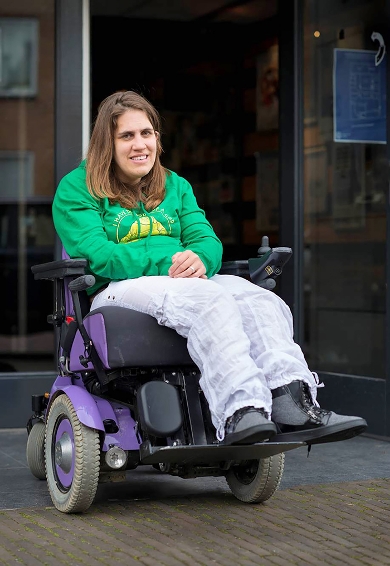
Leiden student nominated for Top 100 Enabled
‘The whole of society benefits if it is accessible for people with a disability.' This is what Pauline Gransier, student of Film and Literary Studies at Leiden University, has to say. She has been nominated for the Top 100 Enabled.
‘I am committed not only to people with a handicap, but to society as a whole. As we get older, everyone comes up against the same obstacles that I am now faced with. The only difference is that I have had these obstacles from birth,' Gransier points out.
Gold Venus de Milo
The 100 Enabled is an initiative of the DELA charity, that is looking for the most inspiring people in the Netherlands with a disability. A specialist jury and a public vote will decide which famous or completely unknown person will win the golden Venus de Milo and 10,000 euros for their chosen charity.
We Stand Up!
Gransier is committed to achieving equality for people with a handicap. She works together with the 'We Stand Up! movement, that she herself founded. The group is made up of ten young adults with a physical or sensory disability. Gransier herself is in a wheelchair and has a hearing impairment. ‘We Stand Up! aims to achieve a turnaround in people's thinking and behaviour regarding the position of people with a handicap in the Netherlands,' she explains. 'One way of doing that is by starting a constructive dialogue with society and politicians.’ The group recently launched a manifesto with twelve propositions for making the Netherlands accessible across all fields of life, that everyone can sign up to online.
Results
And the group is achieving some successful results. At the start of 2016, the House of Representatives and later the Senate adopted legislation that aims to enable people with a disability to take an equal part in society. This means, for example, that buildings and companies have to be better accessible. The efforts of We Stand Up! and other pressure groups have led to the legislation being adopted sooner, according to Gransier. ‘We have set out the problems and obstacles that people with a handicap have to cope with, in concrete terms, and that way we have given them a face.'

Leiden University
Gransier feels at home at Leiden University, she says. 'I have good contacts with lecturers and fellow students, and the university is very good at helping me find solutions to what I can and can't do in terms of the timetable. There are plenty of options, although they may differ from one faculty to another.’
‘My experience at other educational institutions is that they didn't know how to handle my handicaps. Here in Leiden I feel that I am first and foremost a person. That comes about because there's greater awareness in Leiden, or maybe more accessibility; it starts with being open to think about what's possible. If people are prepared to think with you about what's needed, and to discuss the possibilities with you, you're already halfway there.'
No sitting next to fellow students
She does think it's a pity that the are problems with physical accessibility. 'I can't sit next to my fellow students in the lecture rooms or open doors by myself, and the acoustics are often less than ideal. But it takes time to implement improvements.' And there's another typical aspect of student life that Gransier misses: 'I can't go with friends to the pub because most pubs and cafés have no access for wheelchairs.'
Photo above: Caitlin Sas
Vote for Pauline Gransier
Why has Gransier been nominated for the Top 100 Enabled? She won't comment on that herself, but she did forward a mail from a friend who nominated her:
‘I got to know Pauline when we both sat at the front in a concert because we're both disabled. In amongst everyone else, that's what best describes Pauline. She's not someone to go and sit ni a corner and wait until things are handed to her. She knows exactly what she wants, and she does her best to get it. Unfortunately, she's often restricted in what she can achieve; not by her own limitations, but by our society. We don't think about the restrictions we impose on people with a disability. You only realise that if you yourself spend a day sitting in a wheelchair, or if you wear a blindfold or or headphones. Pauline knows exactly what things are like for people in a wheelchair and with a hearing impairment, and she thinks in terms of solutions. She organised her own care team, for example, made up of students who she recruits herself.
‘As well as managing her own care team and studying at Leiden University, Pauline puts her heart and soul into her work for We Stand Up! What's her greatest achievement so far? The UN Treaty that was recently announced. But that's just the start; there's a lot more to be done. And that's why I am nominating Pauline. Pauline's organisation could put the prize money to really good use, but for me it's above all a way of putting her in the limelight for once. She deserves it!'
